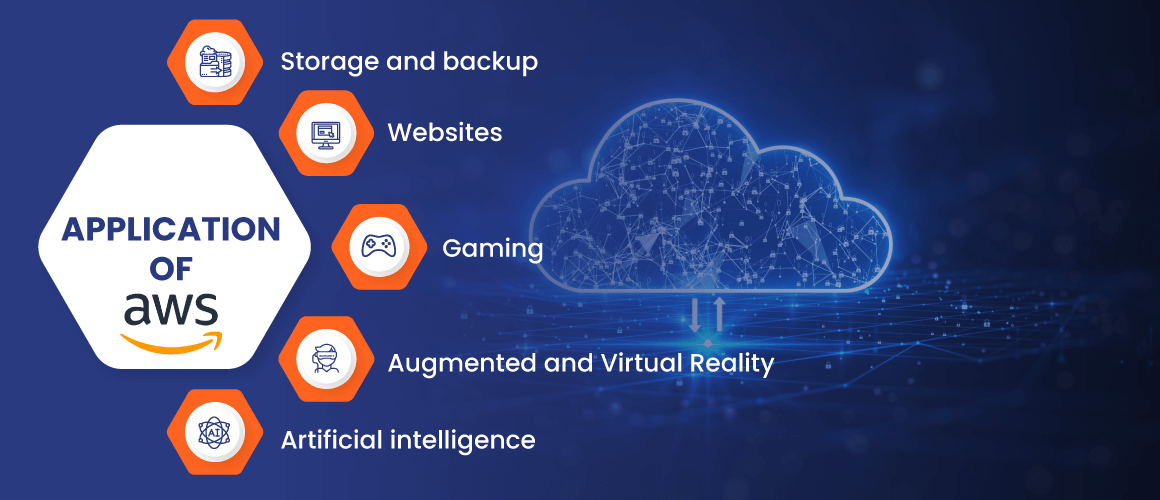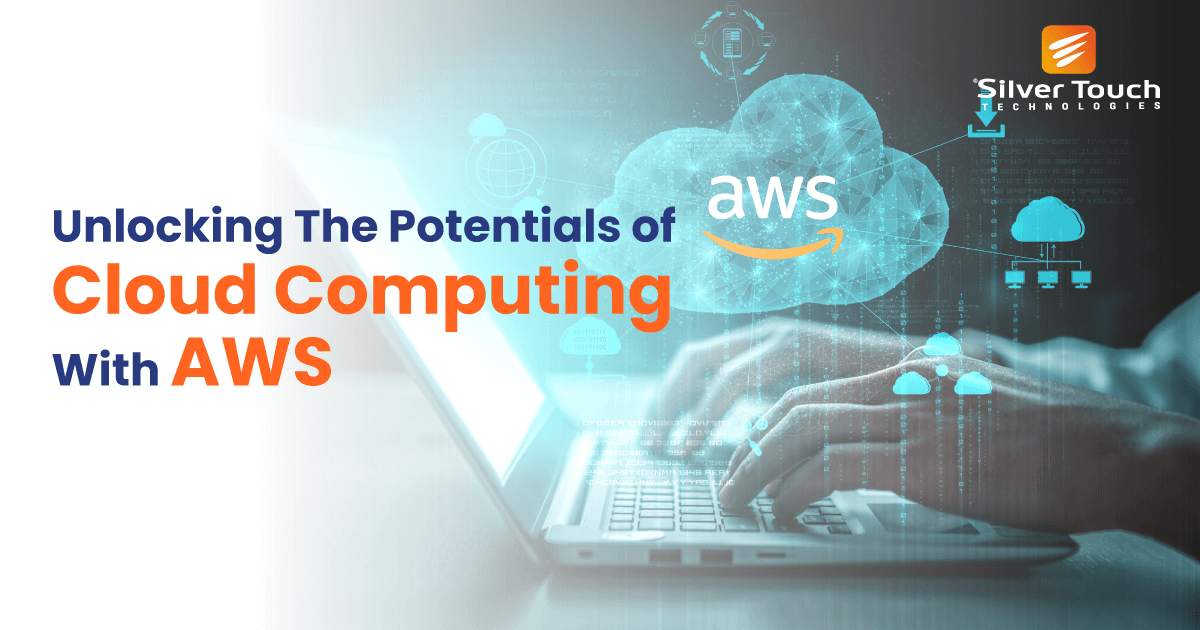Table Of Content
As companies are stepping into a new era of digital transformation, cloud computing is leading the path. It is undeniable that organizations need to be more agile and have continuous access to real-time data. Thanks to cloud computing, all this and more is readily available today. But what is it, and which is the best cloud computing platform? Here is everything you need to know.
What is Cloud Computing?
When computing services like networking, database, storage, software and analytics are delivered over the internet, it is known as cloud computing. It involves utilizing the network of remote servers hosted on the cloud for managing and storing data rather than using on-premise systems. It increases the efficiency of the employees and helps in reducing operational costs. As organizations are becoming more tech-driven, the demand for cloud computing is on the rise and a reliable service provider like Amazon is welcomed with open arms.
Introduction to AWS Cloud services:
AWS is a cloud computing platform launched by Amazon in 2006. It provides over 100 cloud computing solutions. The AWS platform offers flexible, reliable, scalable, easy-to-use and cost-effective solutions. It is developed with a combination of infrastructure as a service (IaaS), platform as a service (PaaS), and packaged software as a service (SaaS) offerings.
Merits of AWS:
-
One of the prime benefits of AWS is its ease of use. AWS provides you with all the information, documentation, and video instructions to help you learn how to use all of its services.
-
Many companies choose AWS because of its flexibility. It allows you to choose operating systems, programming languages, and web application platforms.
-
AWS is highly reliable and accurately performs tasks, and can automatically recover from failure.
-
Another key benefit of AWS includes its ability to process large volumes of data at high speed so you can improve productivity and enjoy high-performance computing services.
-
AWS is a cost-effective solution where you only pay for services you use.
Demerits of AWS:
-
There is a dearth of deft AWS cloud service providers who are well-versed with the infrastructure and understand clients' needs.
-
Since there are millions of AWS across the globe, servers can experience downtime due to massive traffic.
Application of AWS:

While there are several applications of AWS cloud computing services, here are five crucial applications:
-
Storage and backup: AWS offers various types of storage that are easily accessible and that can be used for storing files as well as running vital business applications.
-
Websites: AWS cloud lets businesses host their websites alongside other web applications.
-
Gaming: AWS provides the requisite computing power to run advanced gaming applications and provide the best online gaming experience.
-
Augmented and Virtual Reality: Amazon Sumerian service in AWS lets you AR and VR development tools that play a vital role in e-commerce and sales application, 3D web applications, training simulations, Edtech, marketing and more.
-
Artificial intelligence: AWS has an array of ready-made AI services; Amazon Lex, for example, offers voice and text chatbot technology, Amazon Rekognition, can analyze images and faces and so on.
How does AWS work?
AWS has various service components. Each of these can be customized per the company's needs. You can see configuration options and individual server maps for an AWS service. There are over 200 services in AWS.
How to choose the right AWS services?
AWS provides a plethora of cloud computing services. The top ten include:
-
Amazon EC2: The fastest cloud computing service by AWS, Amazon EC2 is a secure, reliable, and resizable cloud platform that can run any workload ranging from web applications to high-performance computing. Here you need to pay only for what you use.
-
Amazon RDS: It is a database management service where you can select from various database engines, including MySQL, PostgreSQL, Oracle, and SQL Server. Amazon RDS is highly compliant with industry standards.
-
Amazon S3: Amazon S3 is a secure object storage service used to store any volume of data. Some of its features are encryption, replication and access control.
-
Amazon Lambda: Amazon Lambda is a cost-effective, scalable, serverless cloud computing service. It is backed by Amazon's global infrastructure and runs the code based on an event.
-
Amazon Cognito: Amazon Cognito is a secure identity management service that lets you create and manage user accounts, authenticate users, and issue control access to web applications, mobile applications, and IoT devices. The Cognito User Pool feature can be set up without any infrastructure.
-
Amazon Connect: It is a call center service where customers can call Amazon executives for AWS support.
-
Amazon Glacier: Amazon S3 Glacier is a low-cost, long-term storage service used for infrequently used data. There are 3 storage classes: Instant Retrieval, Flexible Retrieval and Deep Archive.
-
Amazon SNS: Amazon Simple Notification Service (SNS) is a fully managed messaging service used to handle a large number of messages. You can use it to can be used to send notifications to customers, such as email, SMS, and push notifications.
-
Amazon Lex: It is one of the AWS cloud-managed services that leverage advanced learning capabilities to understand natural language and generate human-like responses so you can build conversational interfaces for your applications.
-
Amazon Lightsail: It is a VPS service allowing developers and start-ups to host their applications on AWS. Amazon Lightsail can be easily integrated with other AWS services.
What are the best practices for using AWS cloud services:
Secure your AWS environment:
AWS takes customer data security as a top priority and therefore has several compliance frameworks in place to ensure data safety. But you are also responsible for its safety. It is known as the AWS Shared Security Model. A few best practices for securing the AWS environment are-
-
Set passwords that are difficult to crack. Also, opt for multi-factor authentication. You should also change authentications once in 90 days to avoid predictability.
-
If you create multiple IAM roles in AWS, re-evaluate them and close the ones that are no longer in use. Use AWS IAM Access Analyzer to identify all the external places where you shared permission to access, determine the redundant roles and take measures to prevent cyber attacks.
-
AWS will provide you with insightful reports after using services like AWS IAM Access Analyzer, Amazon Security Hub, or Amazon GuardDuty. Use these results to take immediate corrective measures.
Monitor your AWS resources:
Monitoring the AWS resources is also vital to identify potential threats and protect the AWS environment. The following measures can simplify and improve the monitoring efforts-
-
Use AWS CloudTrail to create a historical record of all API calls made to your AWS account. These will come in handy while auditing account activity and investigating dubious activity.
-
Leverage the threat detection service Amazon GuardDuty, which uses machine learning to detect threats and malicious activities in your AWS account. It can identify different kinds of risks, including malware, unauthorized access, and suspicious network traffic.
-
Enable AWS Config that will track changes in AWS resource configuration capable of impacting the account's security. AWS Config can also be used to set rules, violation of which will trigger alerts.
Optimize your AWS costs:
AWS offers flexible pricing. However, there are several ways through which you can further optimize AWS costs, including:
-
Since AWS regularly releases new generations of EC2 instances powered with enhanced performance and robust features, upgrading to the latest versions will improve performance and reduce costs.
-
Release all elastic IP addresses that are not attached to any AWS resources since a small hourly fee is charged for them.
-
Meet the changing demand with proper attribute provisioning with the help of AWS Management Console, the AWS SDKs, or the AWS APIs.
Read more: How Cloud Migration Consulting Helps You Take Benefits of Data Warehousing
Case study: Illumina reduces carbon footprints with AWS
About Illumina:
Founded in 1998, Illumina is an America-based biotechnology company specializing in genetic sequencing. It offers a full range of software services that facilitate advanced genomic research. Illumina is on a mission to improve human health by unlocking the power of the genome.
Overview and scope of using AWS:
In 2012, Illumina introduced BaseSpace Sequence Hub- a push-button platform for storing, managing, processing and analyzing data securely in the cloud. In 2021, the company released Illumina Connected Analytics. It is a highly flexible, scalable and configurable bioinformatics platform that provides its customers with scientific insights.
With time, the genetic data stored by Illumina grew exponentially. During 2021 and 2022, the biotech giant collected more than 24 PB of data in Amazon Simple Storage Service (Amazon S3). It also estimated that this figure would only double every two years.
Illumina is committed to improving human health, and monitoring the carbon footprint of its AWS usage is one such measure. They used the AWS Customer Carbon Footprint Tool to track the carbon emissions. It is a dynamic tool that uses easy-to-understand data visualizations to reveal historical carbon emissions, evaluate emission trends as AWS usage evolves, etc.
Outcome:
The AWS customer carbon footprint tool revealed that Illumina achieved an 89% carbon emissions reduction for its usage in AWS during the 12 months ending November 2022. Illumina's head of corporate social responsibility, Sharon Vidal, informed that the company has pledged to net-zero emissions by 2050. AWS is helping Illumina realize its and its clients' sustainability goals.
The Future of AWS:
Many companies that are at the top of their field, such as Goldman Sachs, Heinken, Phillips, Canva, Salesforce, Pinterest and others, are actively adopting AWS. Amazon always strives to deliver the best customer experiences, and its cloud computing services are no different. In 2023, it is expanding its services and continuing to dominate the cloud market. The future of AWS will revolve around innovation and customer satisfaction.A company that wants to stay future-ready is actively adopting AWS.
Silver Touch- the best choice for your business needs
AWS and Silver Touch Technologies are a power couple your company needs in these changing times. Equipped with 10 years of experience as AWS cloud service providers, we catered to 100+ happy AWS cloud clients. From healthcare to retail and media & entertainment to real estate, we serve clients across various domains. What’s more, you ask? We offer a free AWS well architecture framework review program. Additionally, we have hourly, monthly and yearly engagement models and affordable pricing.Now it is your turn to step into the cloud. AWS professionals and developers at Silver Touch Technologies are here for you. Contact us to leverage the benefits of AWS cloud.



